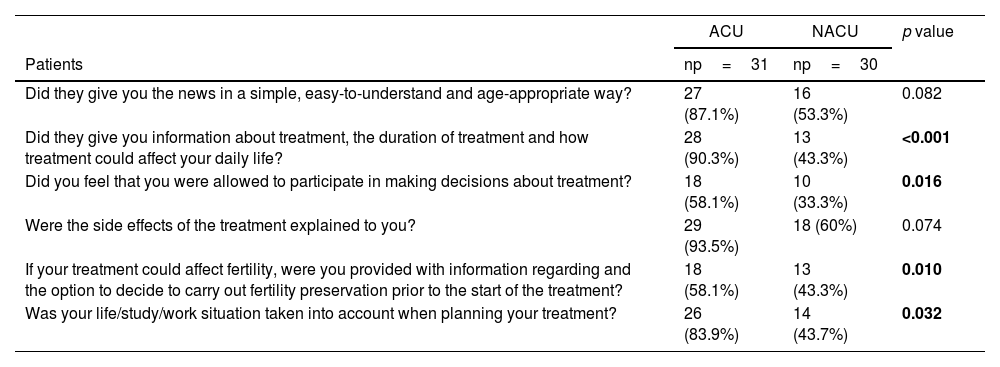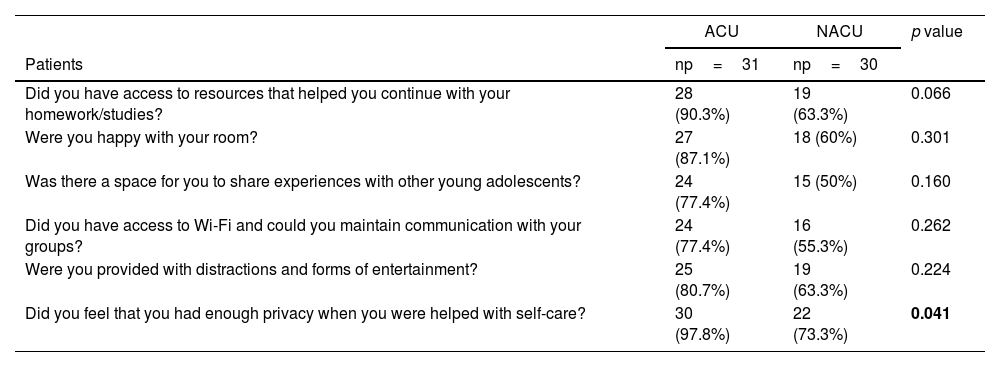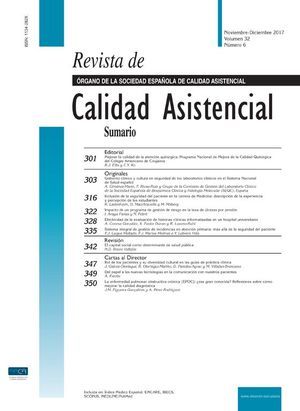To determine whether there are differences in care experience of adolescent cancer patients and their main caregiver, treated in Adolescent Cancer Units (ACUs), compared to those treated in Non-Adolescent Cancer Units (NACUs), including the COVID-19 pandemic period.
MethodMeasurement of Reported Experience in adolescent oncology patients (12–19 years old) and caregivers through ad hoc surveys. The responses of the study group of patients and caregivers treated in Adolescent Units were compared with the group not treated in them.
ResultsIt is noted that many respondents consider that they have not been affected by the COVID-19 pandemic. Significant differences were seen in communication, with better perception by the group of patients treated in ACU (87.1%) and caregivers of ACU (97.3%) compared to patients and caregivers of NACU (53.3% and 68.2% respectively). Regarding information received about the side effects, a better perception was observed among patients treated in the ACU than in the NACU (p=0.247). In the transmission of information and the possibility of fertility preservation, a significant difference was observed in favour of ACU in patients and direct caregivers (p=0.010 and p=0.018).
ConclusionsACU represents an improvement in the quality perceived by patients and main caregiver on key points in the comprehensive care of the adolescent with cancer such as information, participation in the process and decision making, approach to side effects, psychological care and help in returning to normal life. However, fertility and strategies for talking about the cancer experience, were identified as areas for future improvement.
Determinar si existen diferencias en la percepción de los cuidados para los adolescentes y cuidadores principales tratados en Unidades específicas para adolescentes (UAC), frente a los tratados fuera de dichas unidades (NUAC), incluyendo el periodo de pandemia COVID-19.
Material y métodosSe recogen las experiencias reportadas por los adolescentes (12-19 años) y su cuidador principal durante el proceso a través de una encuesta anónima online. Se comparan las respuestas del grupo tratado en Unidades específicas frente al no tratado en las mismas.
ResultadosLa pandemia COVID-19 no afectó a la calidad de los cuidados en ambos grupos. Se objetivan diferencias significativas en la información sobre la enfermedad, recibida por los adolescentes tratados en UAC (87,1%) y sus cuidadores (97,3%) respecto a los pacientes y cuidadores tratados en NUAC (53,3% y 68,2%). Respecto a información sobre efectos secundarios se encuentran diferencias significativas con mejor percepción en el grupo tratado en UAC (p=0,247). La forma de transmitir la información, el abordaje de la fertilidad es mejor abordados para los adolescentes y cuidadores en UAC (p=0,010 y p=0,018).
ConclusionesLas UAC suponen un avance en la calidad de los cuidados y atención en puntos clave como información, participación en toma de decisiones, conocimientos sobre efectos secundarios, apoyo psicológico y ayuda en la vuelta a la normalidad. Las encuestas de calidad percibida son una herramienta para identificar áreas de mejora.
Artículo
Comprando el artículo el PDF del mismo podrá ser descargado
Precio 19,34 €
Comprar ahora












